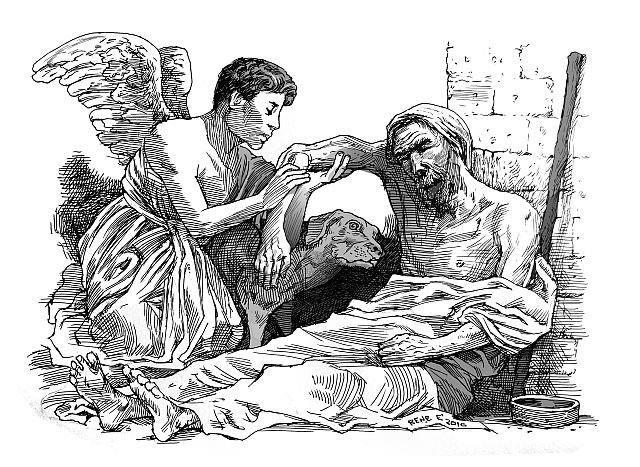IN the second half of the 19th century, Francis James Child published a compilation of traditional ballads from England and Scotland entitled, “The English and Scottish Popular Ballads,” popularly known as “Child Ballads.” Among the ballads was “Dives and Lazarus,” a Christmas carol.
The ballad rests on a parable of Jesus, of which Luke writes in his Gospel –– concerning Dives, a rich man who wore purple and feasted every day while at his door Lazarus, a poor man whose sores the dogs licked, waited, desiring to feed himself with the scraps that fell from Dives’ table.
When both died, the angels carried Lazarus to Abraham’s bosom while Lazarus found himself tormented by flames in the netherworld. He saw far off Abraham with Lazarus at his side and cried out, “Father Abraham, have pity on me. Send Lazarus to dip the tip of his finger in water and cool my tongue.” Abraham reminded him of the reversal in their fortunes, of the enjoyment that he had in his life and the sufferings that Lazarus bore and of a great chasm that prevented anyone from reaching out to the other side.
Dives requested Abraham to at least send Lazarus to his father’s house to warn his five brothers so they would not come to the netherworld and suffer the same torment. When Abraham told him that his brothers had Moses and the prophets to listen to, Dives insisted that it would be different and they would surely feel remorse if someone from the dead went to them. To this Abraham replied, “If they will not listen to Moses and the prophets, neither will they be persuaded if someone should rise from the dead.”
Together with the Ten Virgins, the Prodigal Son and the Good Samaritan, this was among the most frequently illustrated parables in medieval art. It likewise became the subject of many Renaissance paintings, particularly by Bonifazio Veronese and his student, Jacopo Bassano.
The ballad begins:
As it fell out upon a day, Rich Dives he made a feast,
And he invited all his friends,
And gentry of the best.
Then Lazarus laid him down and down,
And down at Dives’ door:
“Some meat, some drink, brother Dives,
Bestow upon the poor.”
“Thou art none of my brother, Lazarus,
That lies begging at my door;
No meat nor drink will I give thee,
Nor bestow upon the poor.”
Not only did Dives not give Lazarus any food, he moreover sent his men to whip him. But strangely, they could not move their hands to strike at him and so had to throw their whips away.
Next, Dives goaded his hungry dogs to attack Lazarus, but the dogs did not have the strength to bite and only ended licking the sores of Lazarus.
The ballad continues:
As it fell out upon a day,
Poor Lazarus sickened and died;
Then came two angels out of heaven
His soul therein to guide.
“Rise up, rise up, brother Lazarus,
And go along with me;
For you’ve a place prepared in heaven,
To sit on an angel’s knee.”
As it fell out upon a day,
Rich Dives sickened and died;
Then came two serpents out of hell,
His soul therein to guide.
“Rise up, rise up, brother Dives,
And go with us to see
A dismal place, prepared in hell,
From which thou canst not flee.”
The ballad continues the narrative as in the parable, and ends with Dives lamenting his fate:
“Oh had I as many years to abide
As there are blades of grass,
Then there would be an end, but now
Hell’s pains will ne’er be past.
“Oh was I now but alive again,
The space of one half hour!
Oh that I had my peace secure!
Then the devil should have no power.”
Of course, in the parable written by Luke, Dives does not send his men to whip Lazarus or set his dogs to mangle him. Dives merely carries on with his usual luxurious life, unconcerned about the beggar that lies outside his door, dying of hunger. This is a familiar scene that Jesus describes, one that we still see today, because man’s disregard of the suffering of others is abiding, a fact that Edith Sitwell recorded in her poem, “Still Falls the Rain,” about human failure and God’s continuing intervention in the world through Christ:
Still falls there Rain
At the feet of the Starved Man hung upon the Cross.
Christ that each day, each night, nails there, have mercy on us –
On Dives and on Lazarus:
Under the Rain the sore and the gold are as one.
Disclaimer: The comments uploaded on this site do not necessarily represent or reflect the views of management and owner of Cebudailynews. We reserve the right to exclude comments that we deem to be inconsistent with our editorial standards.

